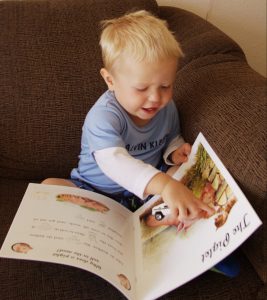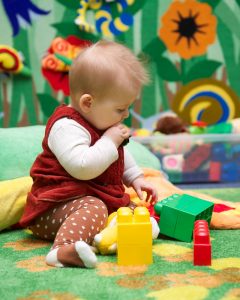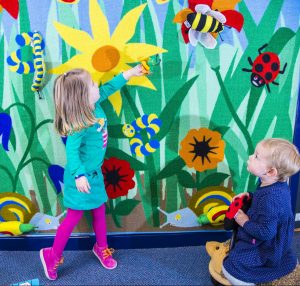Information-seeking and curiosity

From infancy, children notoriously engage both in independent exploration and in seeking information from others. We are interested in understanding the underlying cognitive mechanisms of curiosity-driven learning and its effects on learning outcomes. With regards to the autonomous exploration, we are looking at individual differences in infants’ curiosity and what factors affect their self-guided information selection. On the active social learning side, we are conducting a series of studies to investigate how infants use their developmentally available communicative skills to solicit information from others in social learning contexts, especially in situations of knowledge-related uncertainty. We are also interested in the interplay between curiosity and creativity in early development.
Check out our Curiosity Battery project: https://www.curiosity-battery.co.uk
Publications:
Bazhydai, M., Wong, M. K., Altmann, E. C., Jones, S. D., & Westermann, G. (2026). No Evidence for Curiosity‐Driven Information Selection Advantage in Infants’ Novel Word Learning. Developmental Science, 29(1), e70101. https://onlinelibrary.wiley.com/doi/full/10.1111/desc.70101
Altmann, E. C., Bazhydai, M., Karadağ, D., & Westermann, G. (2025). The Infant and Toddler Curiosity Questionnaire: A validated caregiver-report measure of curiosity in children from 5 to 24 months. Infancy. https://onlinelibrary.wiley.com/doi/10.1111/infa.70001?af=R
Altmann, E. C., Bazhydai, M., Westermann, G. (2025). Curious Choices: Infants’ moment-to-moment information sampling is driven by their exploration history. Cognition. https://doi.org/10.1016/j.cognition.2024.105976
Bazhydai, M., Jones, S. D., & Westermann, G. (Registered Report Stage 1 IPA). Does curiosity enhance word learning in 18-month-old infants? Developmental Science. https://osf.io/tvfqg/
Karadağ, D.*, Bazhydai, M., Koşkulu-Sancar, S., & Şen, H. (2024). The breadth and specificity of 18-month-old’s infant-initiated interactions in naturalistic home settings. Infant Behavior and Development. https://www.sciencedirect.com/science/article/pii/S0163638324000067
Bazhydai, M., & Harris, P. L. (2021). Infants actively seek and transmit knowledge via communication. Commentary on Phillips et al “Knowledge before belief”. Behavioral and Brain Sciences. https://doi.org/10.1017/S0140525X20001405
Bazhydai, M., Westermann, G., & Parise, E. (2020). “I don’t know but I know who to ask”: 12-month-olds actively seek information from knowledgeable adults. Developmental Science. doi:10.1111/desc.12938. Watch the video abstract!
Bazhydai, M., Twomey, K., Westermann, G. (2020). Curiosity and exploration. In: Benson, J.B. (Ed.), Encyclopedia of Infant and Early Childhood Development, 2nd edition. vol. 1 (pp. 370–378). Elsevier. doi:10.1016/B978-0-12-809324-5.05804-1
Ronfard, S., Unlutabak, B., Bazhydai, M., Nicolopoulou, A., & Harris, P. L. (2020). Preschoolers in Belarus and Turkey accept but do not empirically verify an adult’s counter-intuitive claim. International Journal of Behavioral Development. doi:10.1177/0165025420905344
Information transformation and creativity

This research theme concerns creativity, innovation, and play as cognitive processes, and the links between curiosity-driven information-seeking and creativity. It has been proposed that states of curiosity and wonder facilitate both optimal learning and creativity. We are particularly interested in children’s innovative use of knowledge gained and actively sought through either social and autonomous means, and the differential effects of explicitly pedagogical instruction and intrinsically driven information-seeking on creative modification and ideation. We also aim to address the role of children’s affective states, especially when curiosity and creativity occur in highly ambiguous, and even potentially unsettling, contexts.
Publications:
Bazhydai, M., & Westermann, G. (2020). From curiosity, to wonder, to creativity: a cognitive developmental psychology perspective. In A. Schinkel (Ed.), Wonder, education, and human flourishing. VU University Press.
Bazhydai, M., Ivcevic, Z., Widen, S. C., & Brackett, M. A. (2019). Breadth of emotion vocabulary in early adolescence. Imagination, Cognition, and Personality, 38, 378-404. doi:10.1177/0276236618765403
Ivcevic, Z., Bazhydai, M., Hoffmann, J., & Brackett, M. (2017). Creativity in the domain of emotions. In J. C. Kaufman, V. Glaveanu, & J. Baer (Eds.), Cambridge handbook of creativity across different domains (pp. 525-549). Cambridge University Press, UK.
Hoffmann, J. D., Ivcevic, Z., Zamora, G., Bazhydai, M., & Brackett, M. (2016). Intended persistence: Comparing academic and creative challenges in high school. Social Psychology of Education, 19, 793-814. doi:10.1007/s11218-016-9362-x
Ebert (Bazhydai), M., Hoffmann, J. D., Ivcevic, Z., Phan, C., & Brackett, M. (2015). Teaching emotion and creativity skills through art: a workshop for children. International Journal of Creativity and Problem Solving, 25, 23-35.
Ebert (Bazhydai), M., Hoffmann, J. D., Ivcevic, Z., Phan, C., & Brackett, M. (2015). Creativity, emotion and art: Development and initial evaluation of a workshop for professional adults. International Journal of Creativity and Problem Solving, 25, 47-59.
Information transmission and teaching

In this line of research, we are interested in children’s active knowledge exchange in social interactions. Our research questions focus on the type of information children are more likely to transmit to others (i.e. complex or simple; socially or independently learned) and the social and epistemic profiles of people with whom they choose to share information (i.e. ignorant or knowledgeable, confident or shy; peer vs adult) . We conduct experimental laboratory-based and online studies of toddlers’ active information transmission in social learning contexts, as well as investigate these behaviours as they occur spontaneously through analysing child-caregiver daily interactions.
Publications:
Moll, H., Qiu, F. W., Bazhydai, M., & Frye, D. (2025). The Early Emergence of Pedagogical Knowledge: Introduction to the Research Topic” Children’s Teaching”. Frontiers in Developmental Psychology, 3, 1699342.https://doi.org/10.3389/fdpys.2025.1699342
Karadağ, D., Bazhydai, M., & Westermann, G. (2025). Two-year-old but not 5-year-old children transmit previously instructed information. Frontiers in Developmental Psychology. https://www.frontiersin.org/journals/developmental-psychology/articles/10.3389/fdpys.2025.1553491/abstract
Karadag, D., Bazhydai, M., & Westermann, G. (2024). Toddlers do not preferentially transmit generalizable information to others. Developmental Science. e13479. https://doi.org/10.1111/desc.13479
Bazhydai, M., & Karadağ, D. (2022). Can bifocal stance theory explain children’s selectivity in active information transmission? Behavioral and Brain Sciences, 45, E251. doi:10.1017/S0140525X22001327
Bazhydai, M., & Harris, P. L. (2021). Infants actively seek and transmit knowledge via communication. Commentary on Phillips et al “Knowledge before belief”. Behavioral and Brain Sciences. https://doi.org/10.1017/S0140525X20001405.
Gruber, T., Bazhydai., M., Sievers, C., Clément, F., & Dukes, D. (2021). The ABC of social learning: Affect, Behaviour and Cognition. Psychological Review. https://psycnet.apa.org/record/2021-66338-001.
Bazhydai, M.*, Silverstein, P.*, Parise, E., & Westermann, G. (2020). Two-year old children preferentially transmit simple actions but not pedagogically demonstrated actions. Developmental Science. doi:10.1111/desc.12941 (*equal contribution). Watch the Video Abstract!
